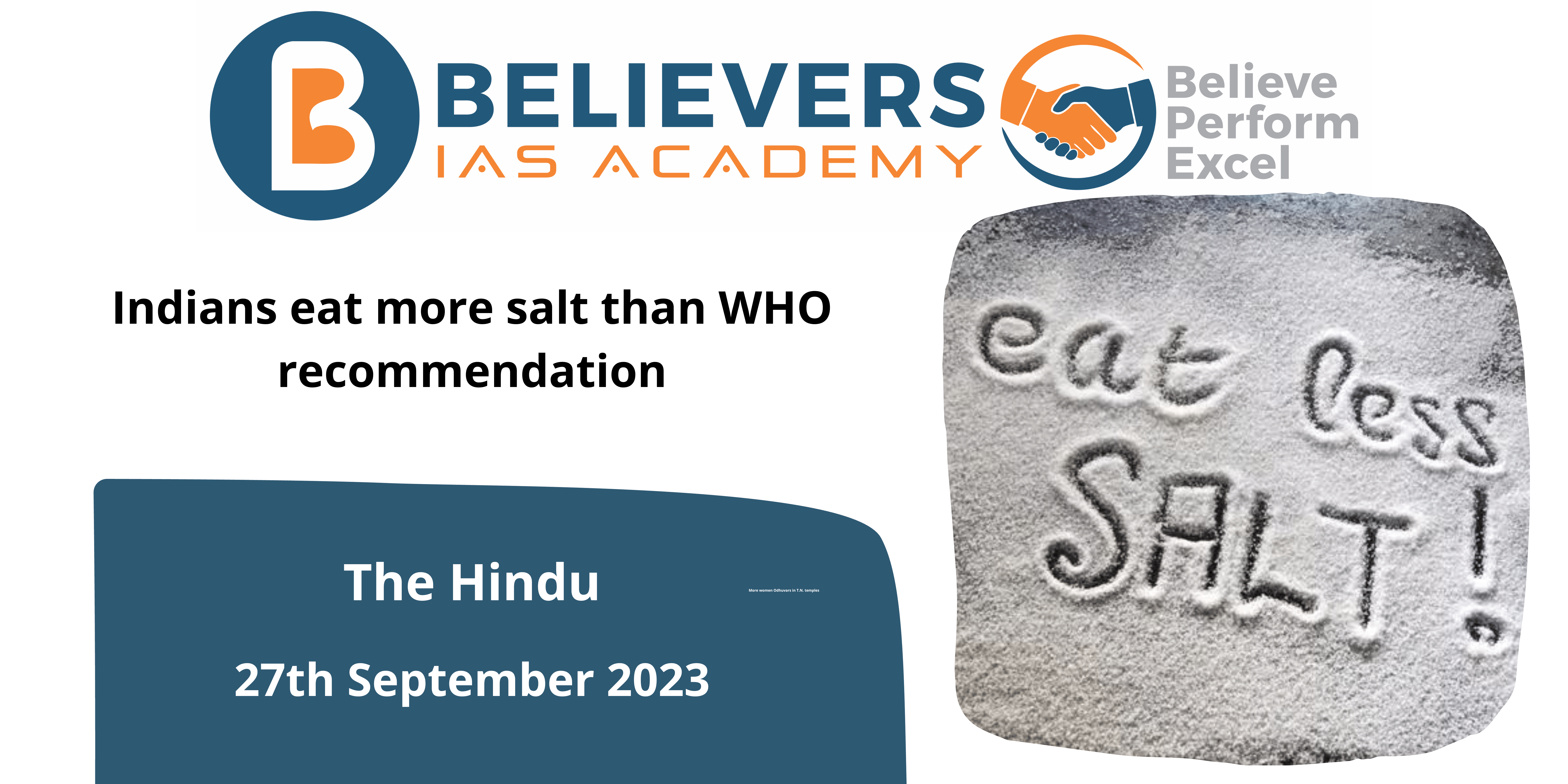Indians eat more salt than WHO recommendation
Context
A study carried out by the Indian Council of Medical Research (ICMR) that was recently published in the journal Nature found that men, people who lived in rural regions, and people who were overweight or obese consumed much more salt than other groups of people.
What results did the Indian Council of Medical Research’s (ICMR) study show?
- High Intake of Salt in India:
- According to the study, the average daily salt consumption in India is estimated to be 8 grams, which is much more than the WHO’s recommended daily limit of up to 5 grams.
- Due to the increased risk of hypertension (high blood pressure) and subsequent cardiovascular disorders, this high salt consumption is a serious health problem.
- Salt Intake Variation:
- The study shows that salt intake varies depending on gender, location (rural vs. urban), and several demographic characteristics.
- A gender difference in eating patterns can be seen in the tendency of men to consume more salt than women.
- People in rural areas typically consume more salt than people in metropolitan areas.
What are the effects of high salt intake?
- Hypertension(High Blood Pressure)
- An increase in blood pressure is among the effects of excessive salt consumption that is best known.
- High blood salt levels can cause water retention and an increase in blood volume, both of which increase blood pressure.
- Heart disease, stroke, and other cardiovascular illnesses are all significantly impacted by hypertension.
- cardiovascular conditions
- An increased risk of cardiovascular disorders, such as coronary artery disease, heart attacks, and strokes, is linked to high salt intake.
- Overconsumption of salt can cause hypertension, which over time can harm the heart and blood vessels.
- Kidney Injury:
- The body’s sodium levels are tightly controlled by the kidneys. As the kidneys work to eliminate extra sodium, a high salt consumption can put stress on them.
- This can eventually result in kidney damage and a higher risk of renal disease.
- Osteoporosis:
- According to some research, a high-sodium diet may cause an increase in calcium excretion in the urine, which may exacerbate osteoporosis and bone density loss, particularly in older people.
What are the other healthy substitutes of Salt that can be used?
- There are a number of healthier alternatives to salt that can improve the flavour of food without adding too much sodium. Herbs, spices, citrus, and other tasty elements are some of these substitutes.
- Basil, rosemary, thyme, and cumin are some herbs and spices that can provide strong flavours. Citrus zest and juice, vinegar, garlic, and onions can give tanginess and depth.
- Additionally, there are inventive methods to season the meal using low-sodium or salt-free seasonings, reduced-sodium soy sauce, nutritional yeast, and herb-infused oils.
What are the recommendations prescribed by the WHO?
- Adults: The WHO advises people to consume no more than 5 grams (or about one teaspoon) of salt daily. This recommendation aims to lower the risk of high blood pressure and the negative effects it may have on one’s health.
- Children: Based on their energy needs, the WHO advises that children between the ages of 2 and 15 should consume even less salt than adults. Early on in life, kids should establish healthy dietary habits, which should include limiting salt intake.
- Infants: The WHO advises exclusive breastfeeding during the first six months of life for infants (up to 2 years of age), as breast milk contains an adequate quantity of salt for their needs. When supplemental foods are offered after six months, salt should be used carefully.
- To lower raised blood pressure by 25%, the study suggests a 30% reduction in the mean population’s salt intake by the year 2025.
- It also emphasizes the significance of altering one’s diet to reduce salt consumption, such as by staying away from processed foods and meals served outside the home.
Conclusion
In conclusion, the ICMR study emphasizes the necessity of all-encompassing public health initiatives to address the issue of excessive salt consumption in India. It offers helpful information and suggestions to direct efforts targeted at lowering salt consumption and minimizing the health hazards connected with it, particularly in the context of cardiovascular illnesses.




